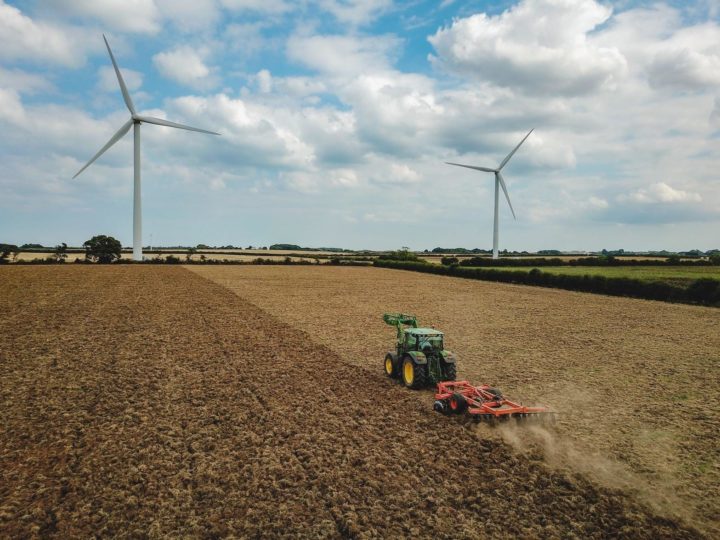A food system hooked on fossil fuels is bad for farmers and families
A surprise result of high gas prices is potential food shortages - but the food system doesn't need to stay hooked on fossil fuels.
By Matt Williams
Share
Last updated:
Food shortages a surprise result of gas price rises

A recent rise in gas prices has caught some off guard, with Energy Minister Kwasi Kwarteng MP making a statement to parliament in response. But what has been more surprising for many is learning that high gas prices could lead to food shortages.
Spiking gas prices have caused two fertiliser plants to shut down. The Government has now stepped in to cover the costs of natural gas to secure the supply of both fertiliser, and the CO2 sold as a by-product.
These factories supply 60% of the CO2 that the UK food industry relies on for fizzy drinks, for slaughtering animals, and for chilling and packaging produce. This CO2 shortage is having a very real and immediate effect on farmers and wider food supplies. The rise in gas prices leading to the risk of food shortages shows how reliant our lives still are on fossil fuels.
Some economists have previously identified that global surges in oil and gas prices can subsequently cause spikes in food prices. A food system that's hooked up to the lifeline of fossil fuels is not a sustainable one for the planet, a predictable one for farmers, nor an affordable one for families.
Decoupling food production from fossil fuels
Severing the link between our food system and fossil fuels would be needed to buffer it against such shocks in future.
There are other ways to produce CO2 which include capturing it from new technologies such as Direct Air Carbon Capture and Storage. This is a technology being developed to suck carbon dioxide from the atmosphere to help climate change, and it’s possible that the CO2 could be sold as a by-product. A company in Switzerland is hoping to do this while this year a plant was activated in Iceland.

However, technological advancements could mean fertiliser plants don’t have to contribute to climate change or rely on fossil fuels. Current “brown” ammonia (using natural gas) could be replaced by “blue” ammonia with carbon capture and storage technology used on the whole manufacturing process, or “green” ammonia that instead uses renewable electricity, water, and air to make ammonia.
The Australian government has provided almost A$3 million in funding to twoplants that are trialling the production of ammonia from hydrogen (instead of natural gas). The International Energy Agency, meanwhile, has estimated that the production of hydrogen and ammonia in China from renewable energy could be cost-competitive with current fossil-fuel based production.
Some farmers are choosing to reduce or abandon their use of fertilisers. For example, precision spraying using robots can reduce the quantities of fertiliser that need to be applied. Other farmers have stopped using fertilisers completely, opting to improve the condition and richness of the soil using other techniques – like reduced ploughing that lets soils recover and growing plants that “fix” nitrogen (a key nutrient) from the atmosphere into the soil.
Some food industry experts say that the best response is to reduce the food system’s reliance on CO2: by reducing consumption of fizzy drinks to benefit people’s health, or by building more local food systems with fresh produce that don’t need so much packaging or chilling.
Time to transform: farming that combats climate change and protects nature
Many farmers know that a consequence of not tackling climate change could be ruined crops in fields, and empty shelves and higher prices in supermarkets. More intense and unpredictable weather is already affecting some UK crops. Fears of food shortages and food price rises could lead some to call for greater intensification, but this comes with risks of soil depletion, the loss of wildlife, and polluted waterways.
Many farmers are now on a mission to help the country achieve net zero and to decarbonise their sector, while continuing the crucial business of food production. New polling by the NFU shows that 84% of farmers want net zero measures to be part of the new system that will reward farmers for environmentally friendly farming.
The climate impacts of the food system are not limited to production in the UK. Growing numbers of consumers are also aware that the food they eat is causing damage to tropical rainforests - when these are cut and used to rear animals for meat - and food companies are beginning to respond. But new environmental laws, like the one the UK is introducing, can help to remove deforestation from the supply chain.
Today we know that working with nature and stabilising the climate will mean we have the weather, water, soil, and pollinators that we are dependent on for food production, reducing the risks of shortages driven by climate change. Now the Government is choosing to reward farmers not just for their crucial role in feeding the nation but also for helping us to get to net zero and restore nature – this is a farming future the UK can showcase as it prepares to host COP26.